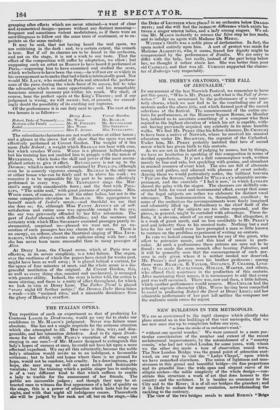MR. PERRY'S ORATORIO, "THE FALL OF JERUSALEM."
IN our account of the last Norwich Festival, we remember to have put this query, "Who is Mr. PERRY, and what is the Fall of Jeru- salem?' It was occasioned by the performance of a very Mas- terly chorus, which we now find to be the concluding one of an oratorio under the above title, and which formed part of the sacred. selections at the festival. The announcement of the entire ora- torio for performance, at the Hanover Square Rooms, on Monday last, induced us to ascertain something of a composer who thus aspired to the highest elevation of which his art is capable, with- out having previously acquired any celebrity in its more humble walks. We find Mr. PERRY (like his fellow-labourer, Dr. CROTCH) to have been a native of Norwich, where he received his musical education under Dr. BECKWITH, the organist of the Cathedral. Under him, Mr. PERRY probably imbibed that love of sacred music which has given birth to this oratorio. As we are not in the habit of judging by names, but by things, we have no hesitation in speaking of this composition in terms of decided approbation. It is not a dull commonplace work, written merely by line and rule, but sparkling with genius, and abundant in musical resource of every kind. The airs are full of alternate energy and pathos, and adorned with phrases of sweet melody. Among them we would particularly notice,' the brilliant bravura "Fair are the flowers," enriched by WILLMAN'S admirable accom- • paniment, and the cantabile "I feel it now," in which LINDLEY shared the palm with the singer. The choruses are skilfully con- structed both for vocal and instrumental effect, except that some of the fugal subjects are rather toe elaborate for distinct vocal utterance. The instrumentation is, throughout, excellent; to ' some of the 'recitatives the accompaniments were finely imagined.. and admirably filled up. Redundancy is the chief fault of the • oratorio : some of the subjects are too often repeated, and. the • pieces, in general, might be 'curtailed with advantage. These de-. fects, it is obvious, admit of an easy remedy. But altogether, it is a work of great merit, and no less creditable to Mr. PERRY'S zeal and industry than to his musical taste. Nothing but a real • love for his art could ever have prompted a man so little known to venture on the profitless experiment of writing an oratorio. In vain we looked among his hearers for any of the great, who affect to patronize music, and this kind of music in parti- cular. At such a performance these patrons are sure not to be found : we made the same remark after hearing Palestine, and it will be generally seen- that the encouragement of such per- sons is only given where it is neither needed nor .deserved: Mr. PERRY'S real patrons were his brother professors : among these were BRAHAM, E. TAYLOR, GOULDEN, F. CRAMER,. LIND- LEY, WILLMAN, MACKINTOSH, MORALT, HARPER, and others, Who offered their assistance in the production of this oratorio. After mentioning their names, it is unnecessary to add that every - part was well sustained. There was, now and then, a little failure, which another performance would remove. Miss CHILDE had the principal soprano character (Mrs. WOOD having been compelled. to assist in producing Robert the Devil at Drury Lane); and her admirable performance of her part left neither the composer nor the audience much cause for regret.


























 Previous page
Previous page